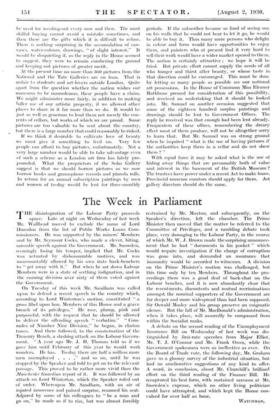The Week in Parliament
THE disintegration of the Labour Party proceeds apace. Late at night on Wednesday of last week Mr. Wallhead moved to exclude the name of Lord Hunsdon from the list of Public Works Loans Com- missioners. He was supported by the miners' Members and by Mr. Seymour Cocks, who made a clever, biting, sarcastic speech against the Government. Mr. Snowden, seemingly losing his temper, implied that Mr. CoCks was actuated by dishonourable motives, and was unaccountably allowed by his own irate back-benchers to " get away with it." But when he sat down Labour Members were in a state of seething indignation, and in the ensuing division over sixty of them voted against the Government.
On Tuesday of this week Mr. Sandham was called upon to defend a recent speech in the country which, according to Lord Winterton's motion, constituted " gross libel upon hon. Members of this House and a grave breach of its privileges." He rose, plump, pink and purposeful, with the request that lie should be allowed to deliver the offending speech " verbatim." " Com- rades of Number Nine Division," he began, in clarion tones. And there followed, to the consternation of the Treasury Bench, a slashing attack on the Labour Govern- ment. " A year ago Mr. J. II. Thomas told us if we gave him until February of this year he would work wonders. He has. To-day there arc half a million more men unemployed . . . ," and so on, until he was stopped by the Speaker and told to get on to the relevant passage. This proved to be rather more vivid than the Manchester Guardian report of it. It was followed by an attack on Lord Winterton, which the Speaker ruled out of order. Whereupon Mr. Sandham, with an air of injured innocence and pained surprise, resumed his seat. Adjured by some of his colleagues to " be a man and go on," he made as if to rise, but was almost forcibly restrained by Mr. Maxton, and subsequently, on the Speaker's direction, left the chamber. The Prithe Minister then moved that the matter be referred to the Committee of Privileges, and a rambling debate took place, very damaging to the Labour Party, in the course of which Mr. W. J. Brown made the surprising announce- ment that lie had " documents in his pocket" which would require investigation if the charge of corruption was gone into, and demanded an assurance . that immunity would be accorded to witnesses. A division on the Prime Minister's motion was challenged, but this time only by ten Members. Throughout the pro- ceedings there was a good deal of back-chat on the Labour benches, and it is now abundantly clear that the resentments, discontents and mutual recriminations amongst the nominal supporters of the Government arc far deeper and more widespread than had been supposed. Sir Oswald Mosley and his group preserve an enigmatic silence. But the fall of Mr. MacDonald's administration, when it takes place, will assuredly be compassed from -within the Socialist ranks.
A debate on the second reading of the Unemployment Insurance Bill on Wednesday of last week was dis- tinguished by first-rate speeches from Major Elliot, Mr. T. J. O'Connor and Mr. Frank Owen, while the Government spokesmen were as ineffective as ever. On the Board of Trade vote, the following day, Mr. Graham gave us a gloomy survey of the industrial situation, but had no ameliorative suggestions of any kind to offer. A word, in conclusion, about Mr. Churchill's brilliant effort on the third reading of the Finance Bill. He recaptured his best form, with sustained sarcasm at Mr. Snowden's expense, which no other living politician could have attempted, and which kept. the House con- vulsed for over half an hour.
WATCHMAN,
































 Previous page
Previous page